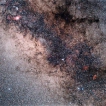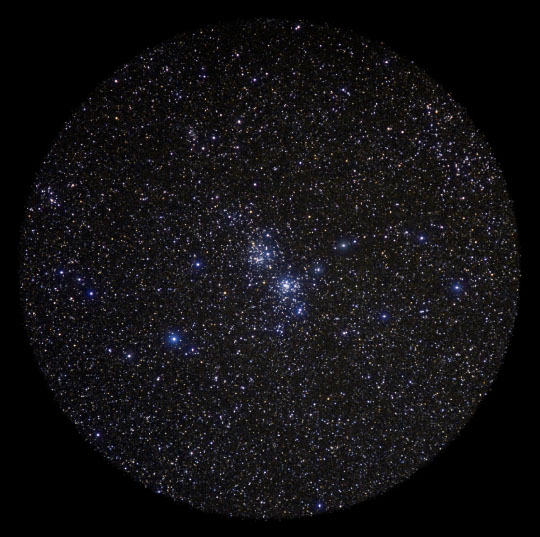Report
It's that season again. And with the long and chilly winter nights awesome binocular objects start populating the northern hemisphere night skies. One of the most beautiful is unquestionably the famous Double Cluster. Also known as h & Chi Persei or NGC 869 and NGC 884, these two adjadent star clusters herald the cold winter months in the norhern hemisphere. They are high up in the sky already in the early evening and easy to find between the two constellations Cassiopeia and Perseus. From a dark observing site, they are easily visible with the unaided eye, but in binoculars or rich field telescopes they develop their true beauty. Their blue-white supergiant stars sparkle brightly and a few red M class supergiants intermingle with the young hot blue stars. This makes h & Chi Persei a true gem in the winter sky. So, remember to give them a try next time when you're out with your bino on one of those crispy clear winter nights.
Our bino simulation image shows the Double Cluster in a six degree field of view. That's how it looks in typical 8x30 or 10x50 binoculars. project nightflight developed a special imaging and image processing technique to give the genuine impression of a binocular view of deep-sky objects. For that purpose we used HDR imaging and a diffusor filter. Post-processing was customized for this shot to make the visual bino experience as realistic as possible. The image sources were made from La Palma, one of the Spanish Canary islands. 42 individual exposures shot with a Canon DSLR camera riding on an AstroTrac TT320X-AG mount were digitally combined to produce this realistic rendering of the Double Cluster observed through binoculars.
Comments
About Me
Contact
| Location: | Vienna, Vienna Austria  |
|---|---|
| Website: | www.project-nightflight.net |









Joe Bindhardt